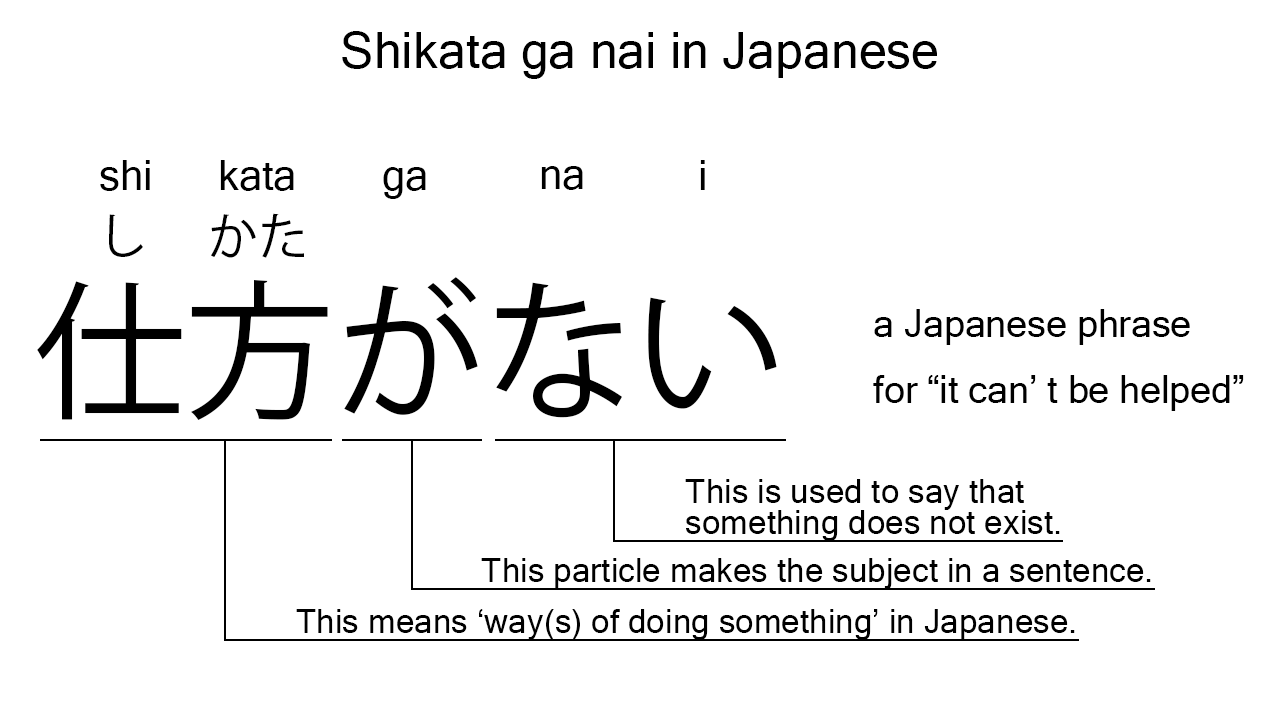What does “shikata ga nai” mean in Japanese?
Native speakers say “shikata ga nai” often to mean ‘it can’t be helped’ in Japanese. Perhaps, some Japanese learners know this phrase as it is sometimes used in Japanese conversations. In this blog post, however, I will explain it in detail based on its grammatical components. And also, I will explain how to use it through an example sentence. My explanations would help Japanese learners understand “shikata ga nai” more clearly. Then, let’s get started!
Contents
- Definition and meaning of “shikata ga nai”
- What does “shikata ga nai” literally mean in Japanese?
- Summary
Definition and meaning of “shikata ga nai”
Let me start with the definition and meaning of “shikata ga nai”
- shikata ga nai – 仕方がない (しかたがない) : a phrase meaning ‘it can’t be helped’ in Japanese.
Japanese native speakers use this phrase when something happens but they do not have any control of it. The usage is very similar to that of the English phrase, “it can’t be helped”. So, Japanese learners, especially those who are familiar with English, can easily understand this phrase, I think.
The definition and meaning are simple and clear. To understand this phrase more clearly, however, let me explain its grammatical components in detail, one by one.
What does “shikata ga nai” literally mean in Japanese?
The phrase consists of the following three components:
- shikata – 仕方 (しかた) : a noun meaning a ‘method’ or ‘way (of doing something)’ in Japanese. This can also work as plural. Learn more about Japanese plural.
- ga – が : a case particle used to make the subject word or the object word in a sentence. In this case, this is used after “shikata” to make the subject in the phrase.
- nai – ない : an i-adjective used to say that something does not exist in Japanese. In the phrase, this is used to deny the existence of the way of doing something.
These three components tell us that the formed phrase literally means ‘there is no way to do something’ in Japanese. This literal interpretation is more or less in line with the actual meaning, I think.

When we meet new Japanese phrases, we should check their grammatical components in detail to understand their meanings clearly and deeply. In many cases, components tell us a lot about the meanings of the phrases they form. Actually, here, we could get the better understanding of “shikata ga nai” through the detailed check above.
So far, I’ve explained the definition and meaning of “shikata ga nai” together with its grammatical components. Then, let me explain how to use it through the example sentence below.
Example: how to say “it can’t be helped” in Japanese
「kore wa shikata ga nai yo」 to kanojo ga watashi ni it ta – 「これは仕方がないよ」と彼女が私に言った (「これはしかたがないよ」とかのじょがわたしにいった)
“It can’t be helped,” she said to me.
Below are the new words used in the example sentence.
- kore – これ : a pronoun used to refer to something close to the speaker. In the example, this is used to mean ‘it’ in Japanese.
- wa – は : a binding particle working as a case marker or topic marker. In the example, this works after “kore” to make the subject in the clause.
- yo – よ : a sentence-ending particle used to state the fact or idea in a soft way. As the definition suggests, this is used at the end of the clause to state her idea softly.
- to – と : a case particle working as a quote marker. In the example, this works after the clause to indicate what she said.
- kanojo – 彼女 (かのじょ) : a pronoun meaning ‘she’ in Japanese. In the example, this works together with the case particle, “ga”, to become the subject in the sentence.
- watashi – 私 (わたし) : a pronoun meaning ‘I’ in Japanese.
- ni – に : a case particle used to say in which direction an action goes. In the example, this is used after “watashi” to indicate to whom she said.
- it – 言っ (いっ) : one conjugation of the verb, “iu“, which means ‘to say’, ‘to tell’, or such in Japanese. In the example, it has been conjugated for the better connection with its following word.
- ta – た : an auxiliary verb used after a verb, adjective, or auxiliary verb to make its past tense form. Probably, this is well known as a part of Japanese ta form. In the example, this is used after “it” to make its past tense form, “it ta”.
This is a typical usage of “shikata ga nai”. In this example, it works as a part of the clause to say “it can’t be helped” in Japanese. Again, but Japanese native speakers use this phrase when something happens but they do not have any control of it. The usage is very similar to that of the English phrase, “it can’t be helped”, I think.
Summary
In this blog post, I’ve explained the definition and meaning of “shikata ga nai” in detail based on its grammatical components. And also, I’ve explained how to use it through the example sentence. Let me summarize them as follows.
- shikata ga nai – 仕方がない (しかたがない) : a phrase meaning ‘it can’t be helped’ in Japanese. This consists of three components: “shikata”, “ga”, and “nai”. These literally mean ‘there is no way to do something’ in Japanese. This literal interpretation is more or less in line with the actual meaning. Japanese native speakers use this phrase when something happens but they do not have any control of it. So, the usage is similar to that of the English phrase, “it can’t be helped”.
Hope my explanations are understandable and helpful for Japanese learners.